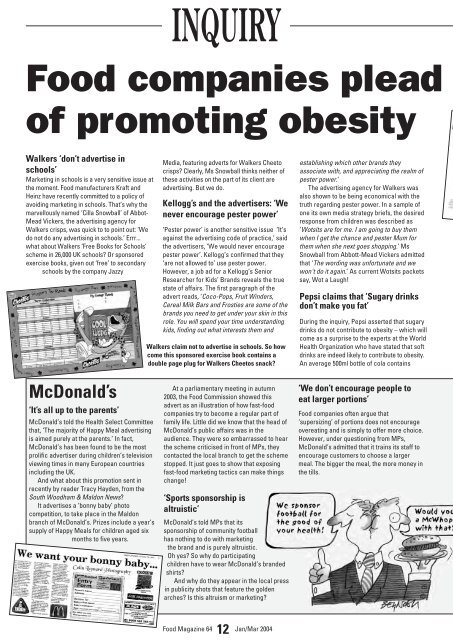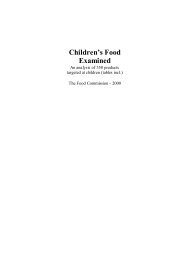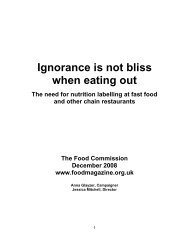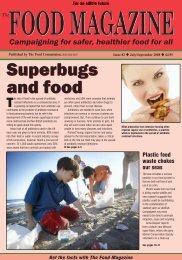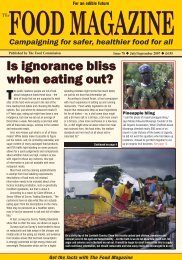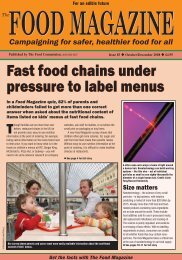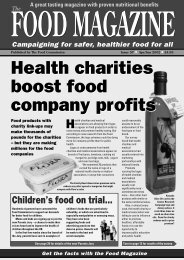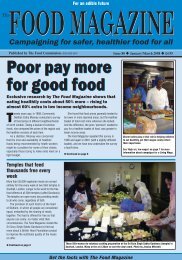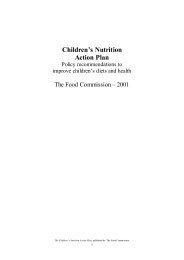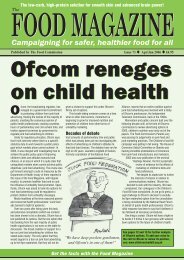Soft drinks - The Food Commission
Soft drinks - The Food Commission
Soft drinks - The Food Commission
- No tags were found...
Create successful ePaper yourself
Turn your PDF publications into a flip-book with our unique Google optimized e-Paper software.
INQUIRY<strong>Food</strong> companies plead ‘of promoting obesityWalkers ‘don’t advertise inschools’Marketing in schools is a very sensitive issue atthe moment. <strong>Food</strong> manufacturers Kraft andHeinz have recently committed to a policy ofavoiding marketing in schools. That’s why themarvellously named ‘Cilla Snowball’ of Abbot-Mead Vickers, the advertising agency forWalkers crisps, was quick to to point out: ‘Wedo not do any advertising in schools.’ Errr...what about Walkers ‘Free Books for Schools’scheme in 26,000 UK schools? Or sponsoredexercise books, given out ‘free’ to secondaryschools by the company JazzyMedia, featuring adverts for Walkers Cheetocrisps? Clearly, Ms Snowball thinks neither ofthese activities on the part of its client areadvertising. But we do.Kellogg’s and the advertisers: ‘Wenever encourage pester power’‘Pester power’ is another sensitive issue ‘It’sagainst the advertising code of practice,’ saidthe advertisers, ‘We would never encouragepester power’. Kellogg’s confirmed that they‘are not allowed to’ use pester power.However, a job ad for a Kellogg’s SeniorResearcher for Kids’ Brands reveals the truestate of affairs. <strong>The</strong> first paragraph of theadvert reads, ‘Coco-Pops, Fruit Winders,Cereal Milk Bars and Frosties are some of thebrands you need to get under your skin in thisrole. You will spend your time understandingkids, finding out what interests them andWalkers claim not to advertise in schools. So howcome this sponsored exercise book contains adouble page plug for Walkers Cheetos snack?establishing which other brands theyassociate with, and appreciating the realm ofpester power.’<strong>The</strong> advertising agency for Walkers wasalso shown to be being economical with thetruth regarding pester power. In a sample ofone its own media strategy briefs, the desiredresponse from children was described as‘Wotsits are for me. I am going to buy themwhen I get the chance and pester Mum forthem when she next goes shopping.’ MsSnowball from Abbott-Mead Vickers admittedthat ‘<strong>The</strong> wording was unfortunate and wewon't do it again.’ As current Wotsits packetssay, Wot a Laugh!Pepsi claims that ‘Sugary <strong>drinks</strong>don’t make you fat’During the inquiry, Pepsi asserted that sugary<strong>drinks</strong> do not contribute to obesity – which willcome as a surprise to the experts at the WorldHealth Organization who have stated that soft<strong>drinks</strong> are indeed likely to contribute to obesity.An average 500ml bottle of cola containsMcDonald’s‘It’s all up to the parents’McDonald’s told the Health Select Committeethat, ‘<strong>The</strong> majority of Happy Meal advertisingis aimed purely at the parents.’ In fact,McDonald’s has been found to be the mostprolific advertiser during children’s televisionviewing times in many European countriesincluding the UK.And what about this promotion sent inrecently by reader Tracy Hayden, from theSouth Woodham & Maldon News?It advertises a ‘bonny baby’ photocompetition, to take place in the Maldonbranch of McDonald’s. Prizes include a year’ssupply of Happy Meals for children aged sixmonths to five years.At a parliamentary meeting in autumn2003, the <strong>Food</strong> <strong>Commission</strong> showed thisadvert as an illustration of how fast-foodcompanies try to become a regular part offamily life. Little did we know that the head ofMcDonald’s public affairs was in theaudience. <strong>The</strong>y were so embarrassed to hearthe scheme criticised in front of MPs, theycontacted the local branch to get the schemestopped. It just goes to show that exposingfast-food marketing tactics can make thingschange!‘Sports sponsorship isaltruistic’McDonald’s told MPs that itssponsorship of community footballhas nothing to do with marketingthe brand and is purely altruistic.Oh yes? So why do participatingchildren have to wear McDonald’s brandedshirts?And why do they appear in the local pressin publicity shots that feature the goldenarches? Is this altruism or marketing?‘We don’t encourage people toeat larger portions’<strong>Food</strong> companies often argue that‘supersizing’ of portions does not encourageovereating and is simply to offer more choice.However, under questioning from MPs,McDonald’s admitted that it trains its staff toencourage customers to choose a largermeal. <strong>The</strong> bigger the meal, the more money inthe tills.<strong>Food</strong> Magazine 64 12 Jan/Mar 2004


